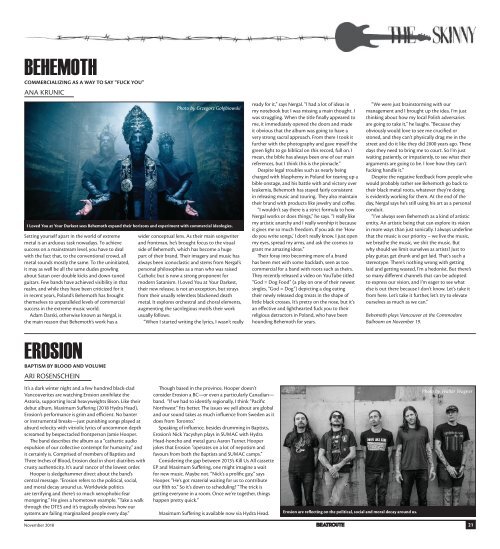BeatRoute Magazine BC Edition November 2018
BeatRoute Magazine is a monthly arts and entertainment paper with a predominant focus on music – local, independent or otherwise. The paper started in June 2004 and continues to provide a healthy dose of perversity while exercising rock ‘n’ roll ethics. Currently BeatRoute’s AB edition is distributed in Calgary, Edmonton (by S*A*R*G*E), Banff and Canmore. The BC edition is distributed in Vancouver, Victoria and Nanaimo. BeatRoute (AB) Mission PO 23045 Calgary, AB T2S 3A8 E. editor@beatroute.ca BeatRoute (BC) #202 – 2405 E Hastings Vancouver, BC V5K 1Y8 P. 778-888-1120
BeatRoute Magazine is a monthly arts and entertainment paper with a predominant focus on music – local, independent or otherwise. The paper started in June 2004 and continues to provide a healthy dose of perversity while exercising rock ‘n’ roll ethics.
Currently BeatRoute’s AB edition is distributed in Calgary, Edmonton (by S*A*R*G*E), Banff and Canmore. The BC edition is distributed in Vancouver, Victoria and Nanaimo. BeatRoute (AB) Mission PO 23045 Calgary, AB T2S 3A8 E. editor@beatroute.ca BeatRoute (BC) #202 – 2405 E Hastings Vancouver, BC V5K 1Y8 P. 778-888-1120
You also want an ePaper? Increase the reach of your titles
YUMPU automatically turns print PDFs into web optimized ePapers that Google loves.
BEHEMOTH<br />
COMMERCIALIZING AS A WAY TO SAY “FUCK YOU”<br />
ANA KRUNIC<br />
Setting yourself apart in the world of extreme<br />
metal is an arduous task nowadays. To achieve<br />
success on a mainstream level, you have to deal<br />
with the fact that, to the conventional crowd, all<br />
metal sounds mostly the same. To the uninitiated,<br />
it may as well be all the same dudes growling<br />
about Satan over double kicks and down-tuned<br />
guitars. Few bands have achieved visibility in that<br />
realm, and while they have been criticized for it<br />
in recent years, Poland’s Behemoth has brought<br />
themselves to unparalleled levels of commercial<br />
success in the extreme music world.<br />
Adam Darski, otherwise known as Nergal, is<br />
the main reason that Behemoth’s work has a<br />
Photo by Grzegorz Gołębiowski<br />
I Loved You at Your Darkest sees Behemoth expand their horizons and experiment with commercial ideologies.<br />
wider conceptual lens. As their main songwriter<br />
and frontman, he’s brought focus to the visual<br />
side of Behemoth, which has become a huge<br />
part of their brand. Their imagery and music has<br />
always been iconoclastic and stems from Nergal’s<br />
personal philosophies as a man who was raised<br />
Catholic but is now a strong proponent for<br />
modern Satanism. I Loved You at Your Darkest,<br />
their new release, is not an exception, but strays<br />
from their usually relentless blackened death<br />
metal. It explores orchestral and choral elements,<br />
augmenting the sacrilegious motifs their work<br />
usually follows.<br />
“When I started writing the lyrics, I wasn’t really<br />
ready for it,” says Nergal. “I had a lot of ideas in<br />
my notebook but I was missing a main thought. I<br />
was struggling. When the title finally appeared to<br />
me, it immediately opened the doors and made<br />
it obvious that the album was going to have a<br />
very strong sacral approach. From there I took it<br />
further with the photography and gave myself the<br />
green light to go biblical on this record, full on. I<br />
mean, the bible has always been one of our main<br />
references, but I think this is the pinnacle.”<br />
Despite legal troubles such as nearly being<br />
charged with blasphemy in Poland for tearing up a<br />
bible onstage, and his battle with and victory over<br />
leukemia, Behemoth has stayed fairly consistent<br />
in releasing music and touring. They also maintain<br />
their brand with products like jewelry and coffee.<br />
“I wouldn’t say there is a strict formula to how<br />
Nergal works or does things,” he says. “I really like<br />
my artistic anarchy and I really worship it because<br />
it gives me so much freedom. If you ask me ‘How<br />
do you write songs,’ I don’t really know. I just open<br />
my eyes, spread my arms, and ask the cosmos to<br />
grant me amazing ideas.”<br />
Their foray into becoming more of a brand<br />
has been met with some backlash, seen as too<br />
commercial for a band with roots such as theirs.<br />
They recently released a video on YouTube titled<br />
“God = Dog Food” (a play on one of their newest<br />
singles, “God = Dog”) depicting a dog eating<br />
their newly released dog treats in the shape of<br />
little black crosses. It’s pretty on the nose, but it’s<br />
an effective and lighthearted fuck you to their<br />
religious detractors in Poland, who have been<br />
hounding Behemoth for years.<br />
“We were just brainstorming with our<br />
management and I brought up the idea. I’m just<br />
thinking about how my local Polish adversaries<br />
are going to take it,” he laughs. “Because they<br />
obviously would love to see me crucified or<br />
stoned, and they can’t physically drag me in the<br />
street and do it like they did 2000 years ago. These<br />
days they need to bring me to court. So I’m just<br />
waiting patiently, or impatiently, to see what their<br />
arguments are going to be. I love how they can’t<br />
fucking handle it.”<br />
Despite the negative feedback from people who<br />
would probably rather see Behemoth go back to<br />
their black metal roots, whatever they’re doing<br />
is evidently working for them. At the end of the<br />
day, Nergal says he’s still using his art as a personal<br />
conduit.<br />
“I’ve always seen Behemoth as a kind of artistic<br />
entity. An artistic being that can explore its vision<br />
in more ways than just sonically. I always underline<br />
that the music is our priority – we live the music,<br />
we breathe the music, we shit the music. But<br />
why should we limit ourselves as artists? Just to<br />
play guitar, get drunk and get laid. That’s such a<br />
stereotype. There’s nothing wrong with getting<br />
laid and getting wasted, I’m a hedonist. But there’s<br />
so many different channels that can be adopted<br />
to express our vision, and I’m eager to see what<br />
else is out there because I don’t know. Let’s take it<br />
from here. Let’s take it further, let’s try to elevate<br />
ourselves as much as we can.”<br />
Behemoth plays Vancouver at the Commodore<br />
Ballroom on <strong>November</strong> 19.<br />
EROSION<br />
BAPTISM BY BLOOD AND VOLUME<br />
ARI ROSENSCHEIN<br />
It’s a dark winter night and a few hundred black-clad<br />
Vancouverites are watching Erosion annihilate the<br />
Astoria, supporting local heavyweights Bison. Like their<br />
debut album, Maximum Suffering (<strong>2018</strong> Hydra Head),<br />
Erosion’s performance is grim and efficient. No banter<br />
or instrumental breaks—just punishing songs played at<br />
absurd velocity with vitriolic lyrics of uncommon depth<br />
screamed by bespectacled frontperson Jamie Hooper.<br />
The band describes the album as a “cathartic audio<br />
expulsion of our collective contempt for humanity,” and<br />
it certainly is. Comprised of members of Baptists and<br />
Three Inches of Blood, Erosion deal in short diatribes with<br />
crusty authenticity. It’s aural rancor of the lowest order.<br />
Hooper is sledgehammer direct about the band’s<br />
central message. “Erosion refers to the political, social,<br />
and moral decay around us. Worldwide politics<br />
are terrifying and there’s so much xenophobic-fear<br />
mongering.” He gives a hometown example. “Take a walk<br />
through the DTES and it’s tragically obvious how our<br />
systems are failing marginalized people every day.”<br />
Though based in the province, Hooper doesn’t<br />
consider Erosion a <strong>BC</strong>—or even a particularly Canadian—<br />
band. “If we had to identify regionally, I think “Pacific<br />
Northwest” fits better. The issues we yell about are global<br />
and our sound takes as much influence from Sweden as it<br />
does from Toronto.”<br />
Speaking of influence, besides drumming in Baptists,<br />
Erosion’s Nick Yacyshyn plays in SUMAC with Hydra<br />
Head-honcho and metal guru Aaron Turner. Hooper<br />
jokes that Erosion “operates on a lot of nepotism and<br />
favours from both the Baptists and SUMAC camps.”<br />
Considering the gap between 2013’s Kill Us All cassette<br />
EP and Maximum Suffering, one might imagine a wait<br />
for new music. Maybe not. “Nick’s a prolific guy,” says<br />
Hooper. “He’s got material waiting for us to contribute<br />
our filth to.” So it’s down to scheduling? “The trick is<br />
getting everyone in a room. Once we’re together, things<br />
happen pretty quick.”<br />
Maximum Suffering is available now via Hydra Head.<br />
Erosion are reflecting on the political, social and moral decay around us.<br />
Photo by Walter Wagner<br />
<strong>November</strong> <strong>2018</strong> 21


















